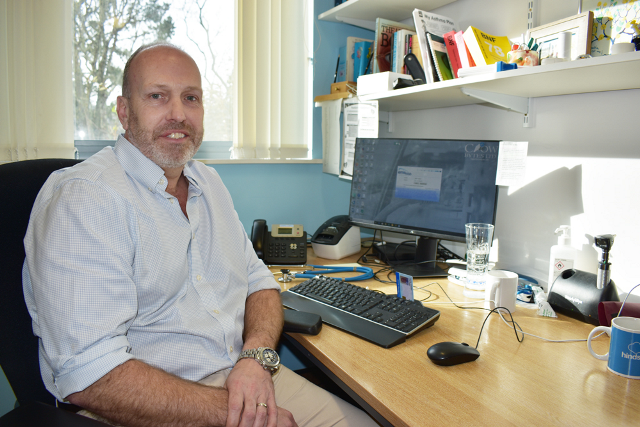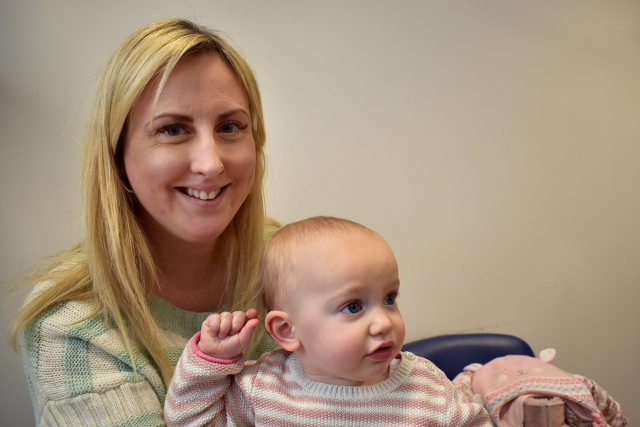‘Behind the scenes’ collaboration key to delivering infant vaccine study

Staff at the The Rame Group Practice are working with colleagues at Derriford Hospital and commercial partners Sanofi Pasteur Inc. to ensure that their patients have access to a vital research opportunity. The Met52 study is a vaccine study designed to evaluate conjugate Men (Meningitis) ACYW vaccine in the UK infant schedule and the practice in Cornwall is one of nine sites nationally recruiting to the study.
Meningitis is an infection of the protective surface that surrounds the brain and spinal cord (meninges). It can affect anyone but is most common in babies, young children, teenagers and young adults. Meningitis can be very serious if not treated quickly it can cause life threatening blood poisoning (septicaemia) and result in permanent damage to the brain or nerves. This is why research into preventing the disease by vaccination is so important.
Lauren Rothwell, 34, was contacted on the phone by the practice to see if she would be interested in taking part in the trial with her baby Aiofe Rothwell. She describes how she got involved in participating in Met52:
“The Practice contacted me and asked if I’d like to be part of the research trial and explained everything to me. I was more than happy to get involved. I think anything that can help with moving the knowledge of vaccines forward is important. Everything was explained and I’m perfectly aware that everything was safe and they gave me all that information.”
All babies normally receive a vaccine against meningitis type B (MenB) as part of the UK vaccination schedule. The new vaccine (MenACYW) aims to protect against additional meningitis types A, C, Y and W. As a Registered Nurse Lauren is aware of the importance of safety in research, she describes the importance of vaccine research to her:
“When it comes to vaccines it’s important that the best information is always given so we are completely aware of what our children are being exposed to and the risks if the vaccine wasn’t given. Coming from working in the medical field I often see strains of meningitis that we do come across and there aren’t vaccines for it. If there is a new one that’s coming out that will make our children safer and less at risk of being exposed to something lethal then I’m all for it.”
The new vaccine has been tested in more than 5,700 people - babies, children, adolescents, adults, and the elderly - and found to be safe and protective against meningococcal disease. However, the MenACYW vaccine is ‘investigational’ meaning that it is not yet licensed for use on children under the age of one in the UK or elsewhere.
The study aims to show whether the immune response to the MenACYW vaccine is as strong as is needed to protect against meningococcal disease when it is given alongside the childhood vaccines given routinely in the UK. The study is also looking at the safety of the MenACYW vaccine and the safety of the childhood vaccines when these are given together.

Dr Lawrence Barnes (pictured above) is Principal Investigator on the study and he describes how the team had to be creative to ensure the study was available for their patients.
“Initially dealing with a paediatric immunisation study with new born babies for General Practice could seem a little bit scary but anything that moves immunisation in a positive direction to try and remove the fear of meningitis has got to be a positive step.”
“It felt like a worthwhile thing to do but it was a bit of a challenge because it involves taking bloods from new born babies which for the general practice isn’t something we do. We’ve thought outside the box and we’ve involved staff from Derriford Hospital from the neonatal unit there and we have them coming in to do the bloods for us and that’s worked phenomenally. We have two nurses from Derriford Hospital who are involved in our research projects for Met52 to come in and do the bloods for us because otherwise we would’ve just said ‘no we can’t do this study’.”
“We’re quite proud of the fact we managed to forge a link and not have to send them across to the hospital which may have been off putting for Mum but we’ve bought the blood taker here.”
“Research is good for the practice there’s lots of evidence that being a research active practice is good for patients. It keeps the team very much up to date and it’s intellectually rewarding.”

Lauren (pictured above with Aoife) has been taking Aoife to the Rame Group for vaccinations and follow up appointments, they will be involved in the study for about a year. The study involves five visits in total during which the child receive all the childhood vaccines normally given to other children in the UK including the Men B vaccine. The extra time allows the Research Team to develop a strong relationship with participants and their children. Lauren describes her experience of being involved in research with her child:
“Going through the trial we felt more special because we get monitored afterwards, the team’s been really lovely and accommodating. I think this has been a really lovely experience. Although it’s not nice seeing your baby get injected and they do respond but they are over it pretty quickly. We’ve been treated really specially and everyone’s been lovely.”
As part of the trial the Research Nurse will monitor the baby immediately after each vaccination and keep in regular contact with you. Laura Nerwall is Senior Health Care Assistant and Paediatrics Phlebotomist from Derriford Hospital in Plymouth and has been visiting the practice to take blood samples. She describes her experience working with the surgery:
“It’s really great to be involved with a GP surgery that’s so interested in research. I come from Derriford Hospital when needed. It’s been good to meet parents and babies and see them throughout their whole time that they come here for that continuation of care.”
The team collaborative effort is typical of teams across the region and country working ‘behind the scenes’ to ensure that research is embedded as part of care but without the willingness of participants like Lauren and baby Aiofe to get involved in research the improvements in care and breakthroughs in medicine wouldn’t happen.
The Met52 is still open for recruitment. And is currently the recruiting at:
- Cornwall: Mounts Bay Medical Group and Rame Group Practice
- Devon: Beacon Medical Group and Royal Devon and Exeter Hospital
- Somerset: Musgrove Park Hospital and Yeovil Hospital



